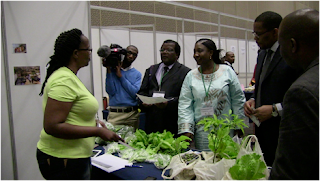'Women indispensable in agribusiness'
The Food and Agriculture Organisation (FAO)'s Representative for South Africa, Dr Tobias Takavarasha, has described the role of women in Agriculture and food security in Africa as indispensable.
Speaking at the just concluded 2nd Conference for Women in Agbribusiness, in Durban, she stated that partnerships in maximising women’s potential in agribusiness entrepreneurship remain critical, “therefore, women who excel in the agrarian sector need to be given due recognition.”
The exhibition at the conference provided female exhibitors the space to showcase their value-add agricultural products. About 200 participants at the conference had the opportunity to also dialogue and share their experiences in agribusiness. In addition, capacity building training was also provided in the area of agribusiness processes.
Dr Martha Mbatha, Chairperson of the Agribusiness Development Agency, maintained that women are still the major producers of food in Africa, producing between 60 to 80 percent of the food output. She insisted that it is important to take heed of women’s voices in agribusiness, whose humility is at times mistaken for ignorance.
But, Mr Cyril Xaba, MEC for the Department of Agriculture and Rural Development in KwaZulu-Natal, said If the statistics are examined more closely, it actually means unleashing the potential of women and development of smallscale farming should be at the heart of the strategy for agrarian transformation.
NEPAD
PICD Director, Mrs Estherine Fotabong, with Mr Cyril Xaba [on her
left] MEC of Agriculture & Rural Development in KwaZulu-Natal,
visiting one of the stands at the conference exhibition.
She emphasized that women have power to contribute more the African economies. Mrs Fotabong also stressed that entrepreneurship is critical to the success of the Sustainable Development Goals (SDGs), the inter-governmentally agreed set of targets for international development leading up to 2030.
In every region of the world, more and more women are seeking economic opportunity and self-determination through enterprise creation. The growth of women’s entrepreneurship is frequently cited on an anecdotal basis, and is increasingly covered and commented upon in the business media.
It is expected that by the year 2018, 9.72 million small, business-related jobs will be created and female entrepreneurs will contribute more than 50% in this job creation space.
Statistics of this nature prove that women are becoming more comfortable in assuming leadership position and creating job opportunities on a large-scale1.

Comments
Post a Comment